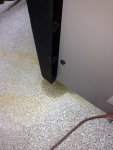Last year our 3 year old Hayward H250 FDN started leaking and eventually we replaced it. At that time we were told it was likely the heat exchanger. I am pretty neurotic about my chemistry but of course no one records all their test results. So last July the identical model heater was installed and used for 3 months. We opened last month and I noticed a little dripping on the first heating stint. Someone suggested it might be some condensation. In any event, I didn't notice it again until last night and this morning. The water temperature was 81 and I had set the temperature for 82 last night. I noticed some water drip and the concrete pad was wet. An hour or so later, it had pretty much dried up. This morning I went out and the heater was on, maintaining 82. I dialed it up to 85 and noticed the wet area again and it was sufficient enough to dampen fingers touching the concrete. Again, an hour or so later it was dried up and hasn't returned all day. These are the same intermittent symptoms I experienced last summer with the previous heater. Here is a link to a thread from last summer with pictures showing the old heat exchanger:
what-caused-this-in-my-3-year-old-hayward-heater-t50449.html
Anyhow, I know it isn't my chemistry. After buying the new heater last summer I have written down the results of every water test I've done. That leads me to believe it must be something to do with the install. Does anyone have any idea what my issue could be? If it's condensation, how is that sorted out? Should I just call Hayward since the warranty should still be valid? Thanks a ton.
Below is a picture of where the water leaks onto the pad.
what-caused-this-in-my-3-year-old-hayward-heater-t50449.html
Anyhow, I know it isn't my chemistry. After buying the new heater last summer I have written down the results of every water test I've done. That leads me to believe it must be something to do with the install. Does anyone have any idea what my issue could be? If it's condensation, how is that sorted out? Should I just call Hayward since the warranty should still be valid? Thanks a ton.
Below is a picture of where the water leaks onto the pad.


